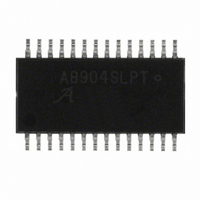A8904SLPTR-T Allegro Microsystems Inc, A8904SLPTR-T Datasheet - Page 11

A8904SLPTR-T
Manufacturer Part Number
A8904SLPTR-T
Description
IC CTRLR/DRVR DC MOTOR 28TSSOP
Manufacturer
Allegro Microsystems Inc
Datasheet
1.A8904SLPTR-T.pdf
(19 pages)
Specifications of A8904SLPTR-T
Applications
DC Motor Driver, Brushless (BLDC), 3 Phase
Number Of Outputs
1
Current - Output
±1.4A
Voltage - Load
4 V ~ 14 V
Voltage - Supply
4.5 V ~ 5.5 V
Operating Temperature
-20°C ~ 85°C
Mounting Type
Surface Mount
Package / Case
28-TSSOP Exposed Pad, 28-eTSSOP, 28-HTSSOP
Lead Free Status / RoHS Status
Lead free / RoHS Compliant
Other names
620-1154-2
A8904SLPTR-T
A8904SLPTR-T
Available stocks
Company
Part Number
Manufacturer
Quantity
Price
Company:
Part Number:
A8904SLPTR-T
Manufacturer:
Allegro
Quantity:
482
A8904
(output crossing through centertap). If the correct polarity of
back-EMF is not detected, a watchdog circuit commutates the
output until the correct back-EMF is detected. Correct back-
EMF sensing is indicated by the FCOM signal, which toggles
every time the back-EMF completes a zero crossing (see wave-
forms below). FCOM is available at the DATA OUT terminal.
commutation delay circuit to advance the state sequencer (com-
mutate) at the proper time to synchronously run the motor. See
next section.
tion delay circuit uses the back-EMF zero-crossing indicator
signal (FCOM) to determine an optimal commutation time for
effi cient synchronous switching of the output drivers. When the
FCOM signal changes state, one of the delay capacitors (C
or C
charging current. When the capacitor reaches the 2.5 V thresh-
old, a commutation occurs. During this discharge period, the
other delay capacitor is being charged in anticipation of the next
FCOM state change. In addition, there is an interruption to the
charging, which is set by the blanking duration (see waveform
below, V
causes the commutation to occur at slightly less than 50% of
the FCOM on or off duration, to compensate for delays caused
by winding inductance. The typical delta voltage change during
normal operation in the commutation capacitors (C
will range between
1.5 V and 2.0 V. The commutation capacitor values can be deter-
mined from:
where V
x 3), duration of each state.
D2
True back-EMF zero crossings are used by the adaptive
Adaptive commutation delay. The adaptive commuta-
) is discharged at approximately twice the rate of the
CD
CWD,
= 1.5 V, I
and next section). This additional charging delay
CD
C
= 20 μA, and t = (60/rpm)/(#motor poles
DX
= I
CD
x t / V
CD
3-Phase Brushless DC Motor Controller/Driver
Functional Description (cont’d)
D1
& C
D2
D1
),
selected should provide adequate margin, taking into account the
effects of capacitor tolerance, charging current, etc.
ing and watchdog timing functions are derived from one timing
capacitor C
sequencer state, a blanking signal is created until the watchdog
capacitor C
below). This blanking signal prohibits the back-EMF compara-
tors from tripping due to the discharging of inductive energy and
voltage settling transients during sequence state transitions. The
duration of this blanking signal depends on the size of the C
capacitor and the programmed charge current, I
27). This blanking pulse also interrupts the commutation delay
capacitors C
is particularly useful during start-up, where the duration of the
diode recirculation current is highest. In applications where
high motor speeds are experienced, the charge current can be
increased so that the blanking period does not encroach signifi -
cantly into the period of each sequencer state and does not cause
unbalance in the commutation points.
application circuit with the A8904 put into step mode. C
should be reselected (only for this test), to be between 4.7 μF
and 10 μF, so that the motor comes to rest between steps and the
maximum diode conduction time can be measured. The value of
C
where t
start-up, and V
WD
To avoid the capacitors charging to the supply rail, the value
Blanking and watchdog timing functions. The blank-
During normal commutation, at the beginning of each new
The ability to select the minimum charge current for C
can be determined as:
It is recommended to select the value of C
d
= measured diode conduction, I
WD .
WD
D1
with Back EMF Sensing
TL
is charged to the threshold V
and C
= 250 mV.
D2
C
WD
115 Northeast Cutoff
1.508.853.5000; www.allegromicro.com
Allegro MicroSystems, Inc.
Worcester, Massachusetts 01615-0036 U.S.A.
from charging (see previous section).
= I
CWD
x t
d
/ V
CWD
TL
TL
= charge current at
(see waveforms
CWD
WD
in the actual
(via D26-
ST
WD
10
WD














